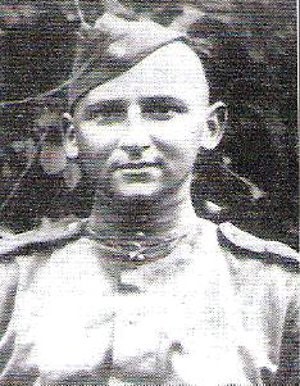Iakov Karasin was born in 1925 in Tukums (Tuckum in German), Latvia. According to a family tradition, his father's ancestors came from Spain, and their original family name was Carasso, which Russian officials changed to Karasin in the 19th century. Iakov's paternal grandmother was the daughter of Rabbi Bezalel HaCohen of Vilna, who headed the Vilna Orthodox community from in 1860s- to the 1880s. Iakov's mother's family arrived in Tukums from Eastern Prussia in the late 18th century. Iakov's mother Doris (or Dvoira ) nee Kramer was brought up on German culture and spoke German. Iakov's father Bezalel (Tsalel) was the inheritor of a successful company that sold grain. However, Tsalel did not possess the commercial talent of his father and grandfather, and the business began to decline. In the 1920s, Doris was forced to open a knitting workshop to support the family. Tsalel died in 1940, shortly before the Soviet occupation of Latvia. Iakov began to study at a German-language school but, after 1933, many Jewish parents, including his parents, withdrew their children from this school, so he ended up studying in a Latvian-language school.
Tukums was a multi-ethnic town, in which Jews constituted 12% of the population prior to World War II, and ethnic Germans – approximately 10%. Karasin recalled that before 1933, Tukums' Jews had good relations with the local Germans. After 1933 a chapter of Hitlerjugend, the Hitler Youth, was established in Tukums, and fights between German and Jewish teens began. Fights between Latvian and Jewish youths were also common. According to Karasin, these fights served to toughen up the local Jewish boys. Later, during the Soviet-German war, many of the latter served in the Red Army and were awarded orders and medals. In 1939 many local Germans repatriated to the Reich.
In 1940 the Soviet Union annexed Latvia, so the German attack on the USSR in June 1941 also affected Iakov Karasin and his family. At the beginning of the Soviet-German war, with difficulty, the Karasin family fled to the town of Cheboksary (east of Moscow), where Iakov helped reconstruct an evacuated factory, where he subsequently worked. In January 1943 Iakov was drafted into the Red Army and assigned to the 1st Latvian Reserve Regiment, with which he underwent military training. Later his regiment was included into the 308th Latvian Rifle Division of the Red Army. Karasin noted that the division was Latvian in name only since half of its personnel were ethnic Russians.
Karasin's active service with this division began in summer of 1944: his first battle was in his native Latvia. In August he was wounded for the first time, but was released from a military hospital in the following month. During the rest of 1944 and in 1945 (until May) he took part in the liquidation of the so-called Courland Pocket of the German Army in northwest Latvia – a very long and bloody operation for both the Red Army and the Wehrmacht. He was wounded twice more. He met VE-Day in Latvian Courland, where the Wehrmacht's Courland group was surrendering. At the end of 1945 Karasin was demobilized and he returned to Tukums, where he worked as an economist. He recalled that antisemitism was rife in postwar Latvia.
In 1966 Iakov Karasin submitted to the Soviet authorities his first request to be allowed to emigrate and settle in Israel. He succeeded to do so only in 1971. In Israel for many years Karasin was the secretary of the Tel Aviv branch of the Organization of Olim (Immigrants) from the Soviet Union. In 2002 he wrote and published the booklet "The Jews of the City of Tukum [sic!]." In this work he stressed that during the German-Soviet war ten percent of Tukums' Jews, i.e., a quarter of those who managed to escape from the town before the German occupation, fought in the Red Army.







